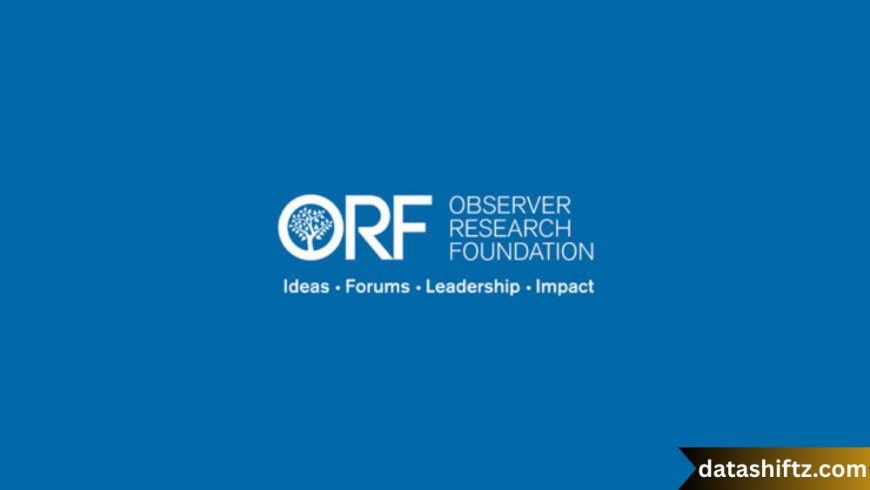ORF: India’s Beacon of Policy Research and Global Dialogue

Introduction
Founded in 1990 during the early waves of economic reforms, the Observer Research Foundation (ORF) has grown into a preeminent independent think tank in India. Based in New Delhi with centers in Mumbai, Chennai, and Kolkata, ORF has distinguished itself through rigorous research, influential dialogues (notably the “Raisina Dialogue”), and impactful policy analysis across global stages
This blog explores ORF’s evolution, mandate, reach, and relevance in shaping policy discourse in India and beyond—providing a comprehensive look at its structure, initiatives, and strategic positioning.
Origins and Mission
Founding & Purpose
ORF emerged in 1990 amid India’s transition toward liberalization. A coalition of scholars, policymakers, and economists sought an independent platform to analyze and shape policy reforms. Over the decades, ORF has transitioned from a domestic economic focus to a multidisciplinary think tank engaged in global policy issues
Today, it serves as a bridge between policymakers, academia, civil society, and international forums—energizing debates around security, economy, governance, technology, energy, and strategic affairs
Mandate in the Knowledge Age
Operating under independent guidance, ORF strives to:
-
Produce non-partisan, evidence-driven research for government, businesses, and civil society.
-
Provide inclusive platforms for diverse voices to shape public discourse.
-
Foster emerging thought leaders in India and abroad
Institutional Structure and Ranking
Organizational Overview
| Feature | Details |
|---|---|
| Founded | 1990, with support from the Ambani family and Reliance Industries |
| Headquarters & Centers | New Delhi; additional centers in Mumbai, Chennai, and Kolkata |
| Core Institutes | Asian Studies, Security Studies, Governance & Politics, Economy & Development |
| Leadership | Chairman: Sunjoy Joshi; President: Samir Saran |
| Staff | Approx. 120 researchers and analysts |
Global Recognition & Rankings
ORF is highly ranked within Asia and globally:
-
Ranked 20th globally and 8th among non-U.S. think tanks in the 2020 Global Go To Think Tank Index
-
Previously ranked 5th in Asia among think tanks across China, India, Japan, and South Korea
-
Top Indian think tank with multiple accolades across categories like “Best Managed” and “Most Innovative”
Key Initiatives & Impact
Raisina Dialogue: India’s Flagship Conference
Launched in 2016, the Raisina Dialogue is ORF's signature annual event, bringing together global leaders in geopolitics and economics. Hosted with support from India’s Ministry of External Affairs, it has positioned India at the heart of global policy dialogue
This forum amplifies ORF’s role, enabling high-level conversations involving heads of state, thinkers, and global strategists—bridging India with global governance debates.
Other Platforms and Focus Areas
ORF hosts several influential platforms:
-
Energy Transition Dialogue for leadership in inclusive energy policies.
-
Cape Town Conversations to foster global dialogue with African partners.
-
ORF Middle East (ORF ME) launched in 2024 to address policy shifts across regions
Its research spans strategic affairs, cyber governance, climate policy, economic development, and foreign strategy, shaping both domestic and international policy narratives
Influence and Critiques
Influence in Policy Circles
ORF wields considerable influence through:
-
Contributions to parliamentary consultations and defense white papers.
-
Regular appearances in global forums like G20, BRICS, and digital governance panels
-
Inclusion in UN and OECD discourses, enhancing India's presence in digital and strategic spheres
Funding Transparency and Influence Concerns
Critics highlight potential conflicts due to funding sources:
-
Initially reliant on Reliance Industries (95% until 2009; now ~65%)
-
Receives foreign grants, including approximately ₹1.76 crore from the Chinese consulate in Kolkata during 2016–2017
-
Comments on potential alignment with elite interests, especially given overlaps in leadership and proximity to government figures
ORF at a Glance
| Attribute | Details |
|---|---|
| Founded | 1990, by Indian intellectuals and policymakers |
| Headquarters | New Delhi; centers in Mumbai, Chennai, Kolkata |
| Key Initiatives | Raisina Dialogue, Energy Transition Dialogue, ORF ME |
| Think Tank Ranking | Top 10 among non-US think tanks; top in Asia |
| Research Domains | Security, governance, economy, climate, cyber policy |
| Funding Sources | Reliance Industries, foreign foundations, government grants |
| Criticism | Questions over funding transparency and neutrality |
| Strategic Outreach | G20, BRICS, MEA, UN platforms |
| Thought Leadership | Policy briefs, global dialogues, strategic papers |
| Mission | Lead inclusive policy thinking to shape India’s global and domestic role |
Why ORF Matters
-
Independent Policy Research: Offers critical, well-informed analysis.
-
Global Platform Builder: Creates dialogue bridges via Raisina Dialogue and other forums.
-
Strategic Agenda-Setter: Influences both domestic and international policymaking.
-
Regional Presence: Expands reach through centers and international affiliates.
-
Public Thought Leadership: Combines scholarship with policy visibility.
-
Diverse Issues Portfolio: Covers vital areas spanning diplomacy to energy and governance.
-
Talent Development: Supports emerging thinkers and interdisciplinary scholarship.
-
Engaged Posture: Acts as both convener and contributor in high-level discourse.
-
Institutional Credibility: Earned high rankings even among global peers.
-
Reflects India’s Aspirations: Embodies India’s ambition to shape global thought leadership.
Conclusion
The Observer Research Foundation (ORF) stands as a pillar of strategic policy thought and international discourse in India. From its inception during economic reforms to its current role in shaping global governance dialogues, ORF exemplifies how a think tank can translate ideas into impact.
Its strengths lie in sustained credibility, diverse research leadership, and powerful platforms. Yet, transparency in funding and maintaining non-partisanship will be crucial as it deepens its influence. In an era demanding smart policymaking and global collaboration, ORF remains a key driver of India’s intellectual engagement with the world.





























